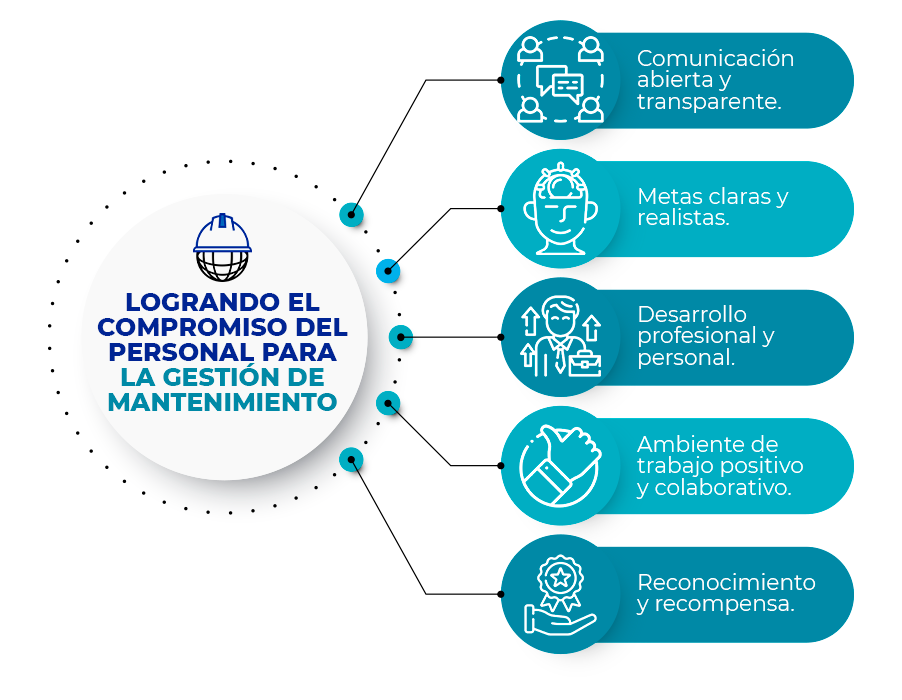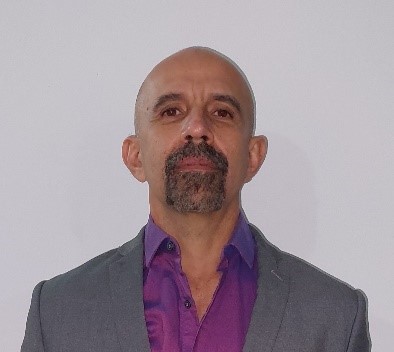Authors: Ph.D. Juan Lugo Marin; Ph.D. Aracely Henríquez.
Staff commitment is a crucial factor in the success of maintenance management. When employees feel engaged and motivated, they strive for excellence in their tasks and contribute to the achievement of organizational goals. In this article, we will explore effective strategies for engaging staff in this important area of management, creating a motivating and productive work environment.

Foster open and transparent communication

Open and transparent communication is essential to achieve the commitment of personnel in maintenance organizations. Establishing effective communication channels, both vertically and horizontally, allows employees to express their ideas, concerns, and suggestions. In addition, it provides an opportunity to share relevant information about the goals, progress, and challenges of the maintenance department. By fostering an environment where everyone feels heard and valued, commitment and collaboration are strengthened.
Define clear and realistic goals

The establishment of clear and realistic goals is essential to generate commitment in all personnel related to maintenance work. By defining achievable goals, employees are given clear direction and a sense of purpose in their daily work. Goals must be specific, measurable, and aligned with the organization’s vision and values. In addition, it is important to recognize and celebrate achievements, which reinforces commitment and motivates staff to overcome new challenges.
Promote professional and personal development

Staff engagement in maintenance management is strengthened by providing professional and personal development opportunities. This can include training programs, challenging project assignments, mentoring, and internal promotion. By investing in the growth and development of employees, you demonstrate their importance and motivate them to continually improve. In addition, aligning personal development with the individual interests and goals of each employee increases their sense of belonging and commitment to the organization.
Foster a positive and collaborative work environment

A positive and collaborative work environment is essential to generate commitment among staff. Promoting collaboration, mutual respect and recognition of individual and team achievements creates a motivating and productive work environment. It is also important to manage conflict effectively and encourage constructive problem solving. When employees feel valued and supported, they are more willing to commit to their work and contribute to the success of the maintenance department.
Recognize and reward exceptional performance

Recognizing and rewarding exceptional performance are powerful drivers of staff engagement in maintenance management . Establishing recognition programs that value individual and team achievements, as well as providing incentives and tangible rewards, generates a sense of gratification and motivation in employees. Publicly acknowledging outstanding achievement, whether through award ceremonies, mentions in internal newsletters, or personal praise, reinforces the importance of commitment and encourages others to strive for excellence.
Conclusions
The commitment of personnel related to maintenance management is a determining factor for the success of any organization. By implementing effective strategies such as encouraging open communication, setting clear goals, promoting professional development, creating a positive work environment, and recognizing exceptional performance, strong and lasting engagement can be achieved.
Staff commitment not only drives productivity and quality in maintenance management, but also creates a motivating and satisfying work environment for everyone involved. By investing in staff engagement, you lay a solid foundation for success and create a culture of excellence in maintenance management.
About the authors:

Eng. Juan Lugo Marín is an Industrial Engineer with a Master’s Degree in Quality and Productivity Management and a PhD in Administrative Sciences. He has Postdoctoral training in Business and Futures Studies (Corvinus University of Budapest, 2007). He has developed a long career as a university professor and researcher. He is a business consultant in the area of quality, management systems and strategic foresight with more than 25 years of experience in sectors such as: oil and gas, engineering and construction, inspection and mechanical integrity, laboratories, among others, for Latin America and North America.

Eng. Aracely Henríquez is an Industrial Engineer with a Master’s in Business Management, PhD in Management Sciences. She has worked as a university professor, researcher in the management area, and organizational advisor in the areas of strategic planning and productivity.

